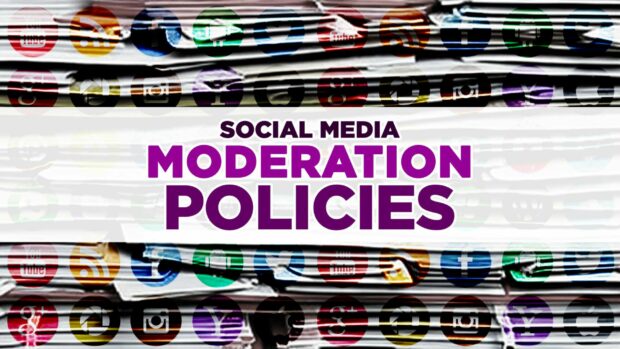In the age of social media, news organizations face constant challenges from online trolls, who attempt to disrupt online discourse and harm reputations. For some reason, social media can turn otherwise normal people into monsters. For news organizations, this is especially problematic and learning how to deal with trolls is an important skill for any newsroom.
Tips For Newsroom Staff On How To Deal With Online Trolls
It is critical for news organizations to recognize the negative impact of online trolls and develop strategies for responding to them. By understanding the motivations and tactics of trolls and taking steps to prevent or address their presence, news organizations can stand strong in the face of online harassment.
Here are some tips on how to deal with trolls for content moderators who work for news organizations.
Use these tips on how to manage trolls for news organizations to help defend your brand's reputation, and continue to create a safe and constructive online environment. #TrollManagement #DealingWithTrolls #Trolling #TrollsAndJournalism Share on XActively Monitor Social Media For Mentions Of Your Organization

Make sure that your news organization has official social accounts and is actively listening for your brand mentions. This includes major social networks like Facebook and Twitter, but don’t forget influential platforms like Reddit too!
DON’T FEED THE TROLLS. Starve Them.

One of the most important tips for news organizations dealing with online trolls, is to not feed them. This means not engaging with trolls and not responding to their nasty comments or posts.
Wait, don’t reply? Why? Because trolls often thrive on attention and will use negative or inflammatory comments to elicit a reaction. Online trolls are essentially people performing digital a temper-tantrum. By ignoring them and not engaging, you can avoid giving them the attention they seek.
It’s also important to remember that you can delete or hide their comments, even or ban them from your page. More on that below.
Tip On How To Deal With Online Trolls: Don't reply. Deny them the attention they seek. #TrollManagement #CombatTrolling #ProtectingOnlineReputation #TrollsAndJournalism Share on XImplement Moderation Policies To Control Online Trolls

All news organizations should have a strict policy in place that outlines the expectations for commenters and outlines the consequences for violating that policy. This policy should be made clear to all readers and enforced without exception. Topics covered in the policy should include language, personal attacks, and other forms of trolling.
It is also important to make sure that all employees, including moderators, are aware of and understand the policy. Moderators should frequently refer to the moderation policy and use it as a guide.
Develop A System For Reporting Trolls
News organizations should establish a system for how to deal with trolls on social media, including a method for identifying and monitoring their comments, a protocol for responding to them, and a means of reporting their behavior to authorities if necessary.
The system should include steps for flagging and tracking trolls, as well as a plan for managing conversations or threads in which they participate.
You can also leverage the power of your community, and provide ways for readers to report any violations of your moderation policies by online trolls. This could be done in the form of an online form, email address, or phone number.
Block Offensive Users
News organizations must take a zero-tolerance approach towards comments that contain harassment, bullying, or hate speech. Such comments should be removed or reported immediately.
One effective way to combat trolls is by blocking or banning their accounts or IP addresses. This can help reduce the number of offensive comments and create a more positive experience for other users.
Blocking offensive users also sends a clear message that this type of behavior is not acceptable. However, it is important to exercise caution and thought when deciding to block a user.
Simple Tips On How To Deal With Online Trolls ... #TrollManagement #DealingWithTrolls #Trolling #TrollsAndJournalism Share on XHow To Respond To Critical Comments
Journalists often feel frustration when audiences do not immediately trust them and may not always clearly explain to audiences why they should be trusted. Social media allows for a more interactive relationship between news organizations and their audience, rather than a one-way broadcast.
The protocol for how to deal with trolls on social media should be carefully crafted to address the trolls’ comments without giving them undue attention or fuel to further engage them.
Determine Your Motivation For Responding
If you do decide to reply to a troll, do so very carefully. Only reply to an online troll’s comment when:
- Doing so would be constructive
- Doing so is NOT motivated by your own emotion or pride. Not sure? Ask someone. When in doubt, ask a coworker for their insight.
- You aren’t being baited. Don’t get baited into a social media fight (i.e., if you reply once and people start piling on). Don’t be tempted to go back in and reply again. Let the first response stand.
Review Message Examples Before Responding
Before responding, review examples of approved messages. You should have these types of examples in your company’s moderation policy. Keep in mind, your reply may get captured or quoted and shared online by trolls. So respond carefully and without being emotional. Here are some sample replies that you might want to use:
Q: I don’t understand _____________ from your story. I must be missing something. I think you left some important details out.
- A: “Hi, _________! Thanks for your feedback. Here’s a link with more information. Let me know if that answers your question.”
- A: “That”s a great feedback! I’ve passed your message along to the reporter who wrote the story.”
- A: “That’s a great question! In the course of our reporting, we asked (insert specific departments or officials here) about that, and they said (their response, even if it was “no comment.”). You can reach out to that person directly if you’d like. (Link to contact info).”
Q: You’re not telling the whole story about ___________!
- A: “Sometimes we don’t report on stories that have been widely reported in other places, stories that have been debunked, or stories that we can’t verify. That doesn’t mean we are ignoring a story, we just don’t have something relevant to publish at this time.”
- A: “Thank you for your suggestion. Please use the contact form on our website to pitch story ideas and suggest corrections.”
Q: Your news organization is a left-wing/right-wing organization. You are fake news!
- A: We are an organization with lots of people who have lots of different views and opinions, but all of us are members of this community and strive to uphold our brand promise. If you have suggestions or feedback, you can share it with us by using our contact form.
What Should You Do If You Feel Unsafe?
If you feel unsafe, then let your manager or human resources know right away. No one is asking you to subject yourself to online abuse.
Use Your Best Judgement
There is no hard and fast rule for how to properly manage online trolls. These are guidelines for how you might respond, but there are always going to be unique cases that don’t align with what has been outlined here.
Use your best judgment, and lean on your coworkers and manager for advice when you don’t know what to do. When in doubt, flag the comment and let your supervisor know!
News organizations can contribute to a secure and respectful atmosphere for all their readers by taking a strong stance against bullying and harassment by online trolls. #TrollManagement #DealingWithTrolls #Trolling #TrollsAndNews… Share on XTips On How To Deal With Online Trolls For News Organizations
Social media can sometimes be a minefield of negative content, but it also provides news outlets with a chance to develop connections with their readers. Knowing the reasons why trolls act and taking measures to stop or confront them can help news organizations stay firm in the face of online abuse. Remember these tips:
- Monitor: To combat trolls and other harmful individuals, news organizations should implement stronger security measures and regularly monitor their social media accounts.
- Ignore: Trolls thrive on negative interactions. Don’t feed the trolls! Ignore them.
- Create A Policy: All news organizations should have a strict policy in place that outlines the expectations for commenters and outlines the consequences for violating that policy.
- Tools For Reporting Trolls: News outlets should devise a plan to deal with online trolls, including ways to recognize and observe their remarks, a process for responding to them, and a system for reporting their behavior to the relevant groups if required.
- Block/Ban: Comments containing harassment, bullying, or hate speech should be removed/reported and accounts/IPs blocked to reduce offensive comments. Remember to exercise caution when blocking users.
- Reply Carefully: Replying in a positive and friendly manner with constructive comments can help to create stronger relationships with your audience and even foster trust with the public. Engaging in productive communication with your audience can have benefits, but should be done with caution.
To preserve credibility and encourage productive discussions, it is crucial for news organizations to recognize trolling and take proactive measures to defend against it. By implementing these strategies for how to deal with trolls on social media, news organizations can maintain the safety and security of their sites and the integrity of their content.
Stop allowing online trolls to squander your precious time any longer -- reclaim authority over your digital environment by executing these straightforward tactics on how to deal with trolls. #TrollManagement #DealingWithTrolls… Share on XI’m a dog owner that loves poetry, vampires, mountain biking, and cosplay. I’m open to ideas and still trying to figure my SFO life out one blog post at a time. LF ISO SWF GSOH SI DDF.

























 Microsoft Plans To Put ChatGPT AI Tools in Every Office 365 Product
Microsoft Plans To Put ChatGPT AI Tools in Every Office 365 Product
Leave a Reply
You must be logged in to post a comment.